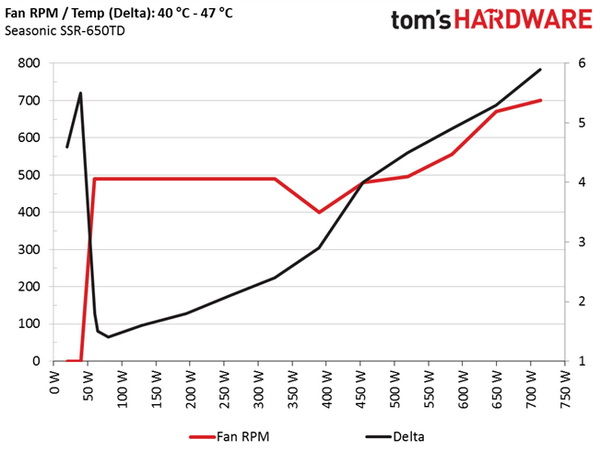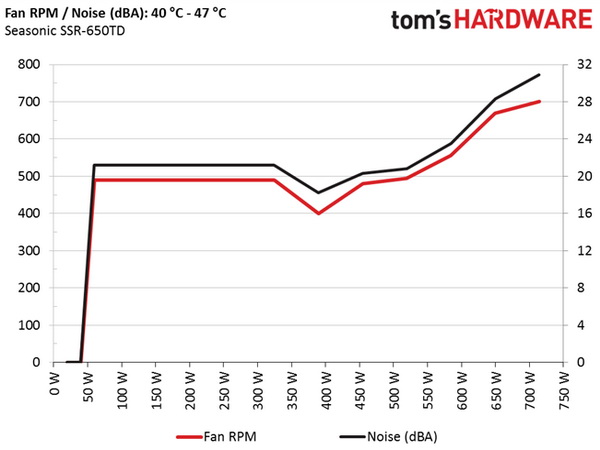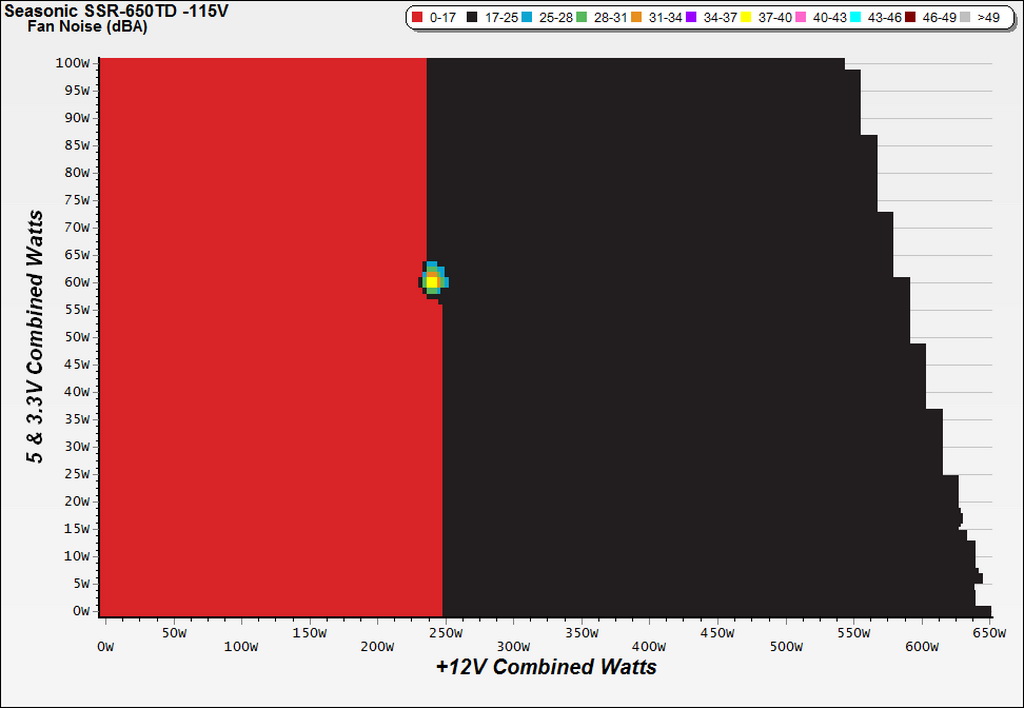Seasonic Prime Titanium 650W PSU Review
Seasonic jumps onto the 80 PLUS Titanium wagon with three new units that belong to its Prime family. The 650 W model is under our scope today. Besides high efficiency, it also offers great performance, quiet operation, and nice looks.
Why you can trust Tom's Hardware
Efficiency, Temperature And Noise
Efficiency
Our efficiency testing procedure is detailed here.
Using the results from the previous page, we plotted a chart showing the SSR-650TD efficiency at low loads, and loads from 10 to 110 percent of its maximum-rated capacity.
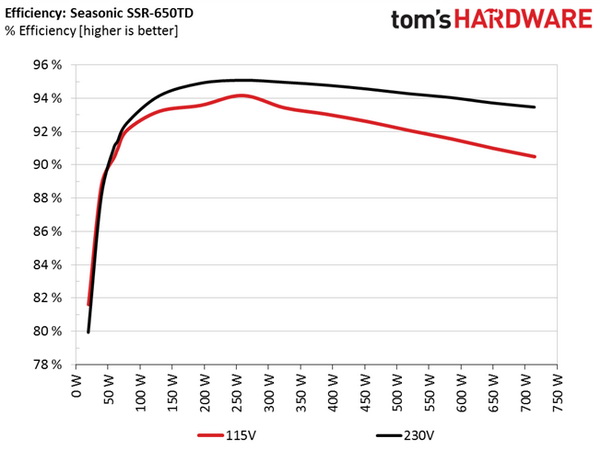
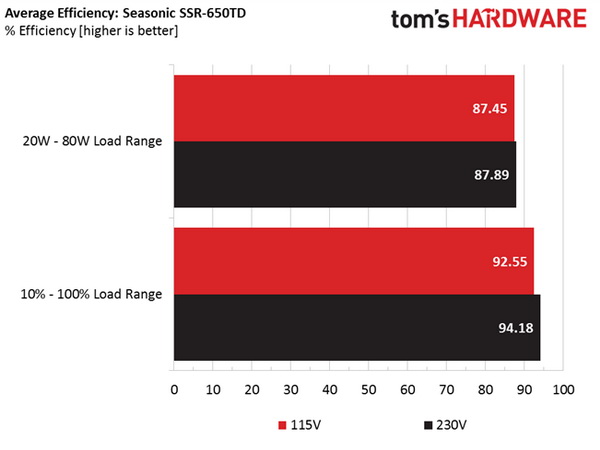
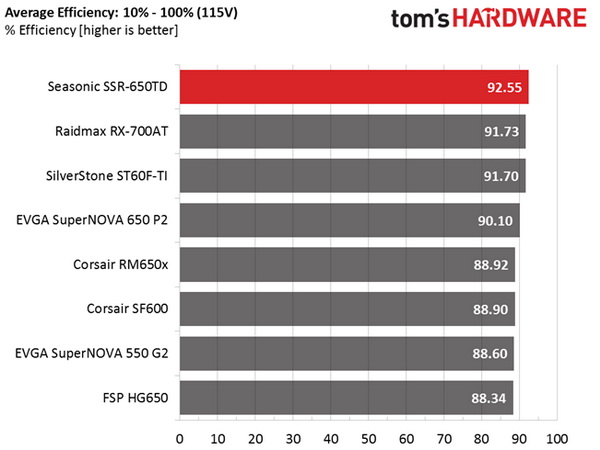
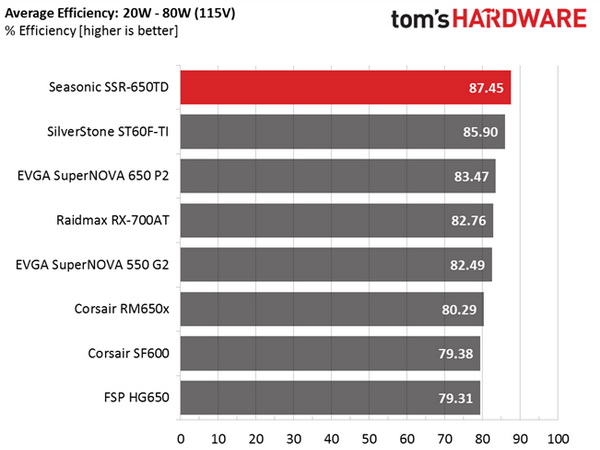
In the 600 to 650 W category, there is no opponent able to match the SSR-650TD's amazing efficiency under light and normal loads. Seasonic does an amazing job with this platform. Finally, Super Flower's Titanium-class Leadex units have a worthy opponent.
Efficiency At Low Loads
In the following tests, we measure the SSR-650TD's efficiency at loads significantly lower than 10 percent of its maximum capacity (the lowest load the 80 PLUS standard measures). The loads we dialed were 20, 40, 60 and 80 W. This is important for representing when a PC is idle, with power-saving features turned on.
| Test # | 12V | 5V | 3.3V | 5VSB | DC/AC (Watts) | Efficiency | Fan Speed | Fan Noise | PF/AC Volts |
|---|---|---|---|---|---|---|---|---|---|
| 1 | 1.188A | 0.492A | 0.480A | 0.196A | 19.60 | 81.60% | 0 RPM | 0 dB(A) | 0.792 |
| 12.250V | 5.014V | 3.329V | 5.008V | 24.02 | 115.2V | ||||
| 2 | 2.406A | 0.990A | 0.989A | 0.395A | 39.70 | 88.76% | 0 RPM | 0 dB(A) | 0.909 |
| 12.249V | 5.012V | 3.326V | 5.003V | 44.73 | 115.2V | ||||
| 3 | 3.624A | 1.488A | 1.500A | 4.999A | 59.82 | 90.47% | 490 RPM | 21.2 dB(A) | 0.953 |
| 12.247V | 5.010V | 3.325V | 4.999V | 66.12 | 115.2V | ||||
| 4 | 4.834A | 1.995A | 1.984A | 0.799A | 79.77 | 92.08% | 490 RPM | 21.2 dB(A) | 0.965 |
| 12.245V | 5.009V | 3.324V | 4.995V | 86.63 | 115.2V |
The PSU operates passively during the first two light-load tests, and our efficiency results are impressive overall. Even with 19.6 W load, efficiency easily surpass the 80 percent mark. Meanwhile, other PSUs struggle to stay above 70 percent.
5VSB Efficiency
The ATX specification states that 5VSB standby supply efficiency should be as high as possible, recommending 50 percent or higher efficiency with 100 mA of load, 60 percent or higher with 250 mA of load and 70 percent or higher with 1 A or more of load.
We take four measurements: one each at 100, 250 and 1000mA, and one with the full load the 5VSB rail can handle.
Get Tom's Hardware's best news and in-depth reviews, straight to your inbox.
| Test # | 5VSB | DC/AC (Watts) | Efficiency | PF/AC Volts |
|---|---|---|---|---|
| 1 | 0.101A | 0.51 | 73.91% | 0.074 |
| 5.004V | 0.69 | 115.2V | ||
| 2 | 0.251A | 1.25 | 78.13% | 0.159 |
| 4.996V | 1.60 | 115.2V | ||
| 3 | 1.001A | 4.96 | 81.05% | 0.349 |
| 4.960V | 6.12 | 115.2V | ||
| 4 | 3.001A | 14.61 | 79.58% | 0.463 |
| 4.869V | 18.36 | 115.2V |
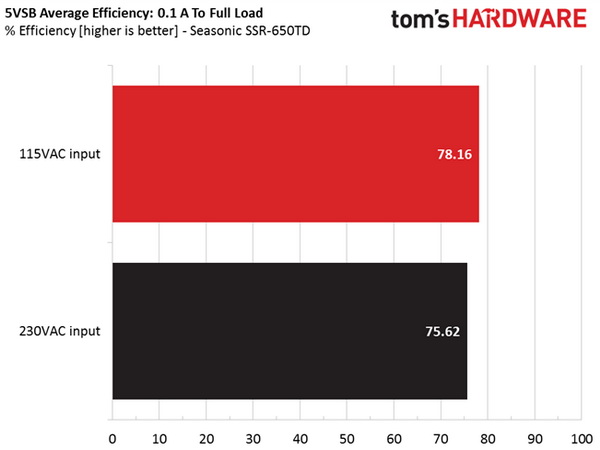
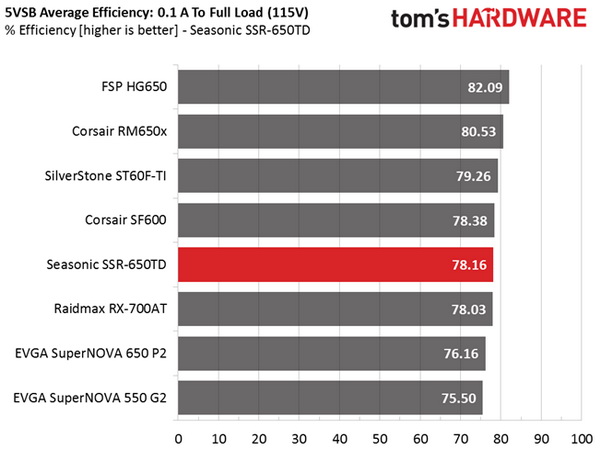
The 5VSB rail offers decent efficiency, though we expected more from this platform. We are being really picky here, but this is a Titanium-class PSU, so we have to be.
Power Consumption In Idle And Standby
In the table below, you'll find the power consumption and voltage values of all rails (except -12V) when the PSU is idle (powered on, but without any load on its rails), and the power consumption when the PSU is in standby mode (without any load, at 5VSB).
| Mode | 12V | 5V | 3.3V | 5VSB | Watts | PF/AC Volts |
|---|---|---|---|---|---|---|
| Idle | 12.271V | 5.030V | 3.331V | 5.030V | 4.22 | 0.262 |
| 115.1V | ||||||
| Standby | 0.06 | 0.006 | ||||
| 115.1V |
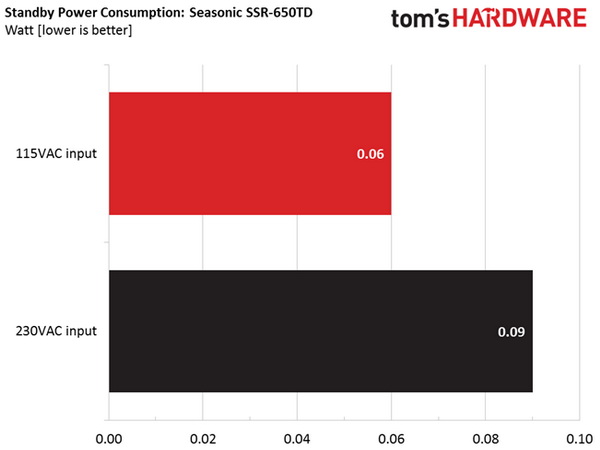
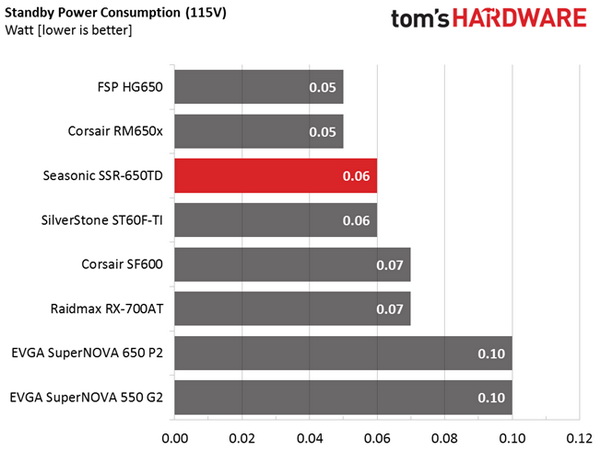
The energy that Seasonic's SSR-650TD consumes at standby is very low, as you can see in the table above.
Fan RPM, Delta Temperature And Output Noise
Our mixed noise testing is described in detail here.
The first chart below illustrates the cooling fan's speed (in RPM), and the delta between input and output temperature. The results were obtained at 40 °C (104 °F) to 47 °C (116.6 °F) ambient temperature.
The next chart shows the cooling fan's speed (again, in RPM) and output noise. We measured acoustics from one meter away, inside a small, custom-made anechoic chamber with internals completely covered in sound-proofing material (be quiet! Noise Absorber kit). Background noise inside the chamber was below 18 dB(A) during testing, and the results were obtained with the PSU operating at 40 °C (104 °F) to 47 °C (116.6 °F) ambient temperature.
The following graph illustrates the fan's output noise over the PSU's operating range. The same conditions of the above graph apply to our measurements, though the ambient temperature was between at 28 °C (82.4 °F) to 30 °C (86 °F).
Up to around 250 W load, the PSU operates passively, hence its noise output is zero. Once the fan is engaged, it spins quickly for a short period to exhaust heated air, after which is drops to its lowest speed. The SSR-650TD's overall noise output is really low, making this PSU a great choice if you plan to build a quiet PC.
Current page: Efficiency, Temperature And Noise
Prev Page Load Regulation, Hold-Up Time, And Inrush Current Next Page Protection Features
Aris Mpitziopoulos is a contributing editor at Tom's Hardware, covering PSUs.
-
bharatwd 60 Ampere of inrush current is too high for 230 V countries. Wont that damage the other parts in the pc?Reply -
Aris_Mp It won't damage anything in the PC since it doesn't have to do anything with the PSU's secondary side. High inrush currents apply stress to the electrical infrastructure (switches, relays etc.)Reply -
bharatwd Hi Aris, thanks for the reply..............So it will basically hurt the PSU components itself?Reply -
turkey3_scratch My mind is blown. This is a great unit and I'm happy to see the transient response performance was good. HardOCP's testing on one of the Prime Titanium units shows not-so-good transient response performance.Reply
Whoops accidental upvote above. -
Aris_Mp Nope it won't hurt the PSU, just the breakers and electrical circuits before it will be stressed a bit.Reply
Haswell ready: I was thinking to change this to S6/S7 compatible. Probably the time has come for this to happen. -
bharatwd Thanks for the reply Aris........10 years warranty will be fun if the current inrush is at 60+ Ampere :) especially in India :)Reply -
Virtual_Singularity Excellent review. Impressive work/effort by Seasonic as well. Curious to see how the other units in this new line stack up to this one. Haven't seen HOCP's review yet, but there has been some variance in others, but still seems like a solid effort on Seasonic's part.Reply
With no capacitors in the cables, can't see a reason not to flatten the atx connector as well. I guess the sleeved atx connect look has become somewhat traditional. Not a criticism by any means, just saying. -
turkey3_scratch Reply18563170 said:Excellent review. Impressive work/effort by Seasonic as well. Curious to see how the other units in this new line stack up to this one. Haven't seen HOCP's review yet, but there has been some variance in others, but still seems like a solid effort on Seasonic's part.
With no capacitors in the cables, can't see a reason not to flatten the atx connector as well. I guess the sleeved atx connect look has become somewhat traditional. Not a criticism by any means, just saying.
On Jonnyguru Oklahomawolf likes the ATX cable to be sleeved and the others to be ribbon; this is because 24 wires can sometimes become difficult to manage in ribbon style versus sleeved. That's just his thinking at least, and I sort of understand where he comes from with that. If it's ribbon style that also makes it an extremely wide cable, whereas if it is sleeved it's more narrow for better cable routing and then widens up at the end. -
JackNaylorPE I find round sleeved cables much more difficult to manage, and the reason why many builders sleeve there own cables or use extensions. OTOH, the plain flat cables are just fugly, you can get the best of both worlds with flat, individually sleeved cables. Individually sleveed cables, with cable combs, offer the optimal combination of aesthetic choice and easier cable routing.Reply
I don't really understand the big "ooh wow" about Titanium rates PSUs; all it is is a "green" energy consumption rating and unless you pay well above the average US utility costs, you'll never get a positive ROI. What I don't understand is why "PSUs and cables" aren't offered as a "bundle". I hate paying a quality set of cable and then leaving them in a box. I'd like to see some PSU manufacturer "step up" and and say offer every PSU with a $xx coupon for a set of cables. The value of the coupon would cover the basic cable set so it would essentially come free with the PSU. OTOH, if you wanted to move up to a, individually sleeved set, you would only have to pay the difference between the base set and the set of your choice
http://www.frozencpu.com/products/18823/psu-cab-50/Corsair_Professional_Series_Individually_Sleeved_DC_Modular_Cable_Kit_Type_3_Generation_2_-_White_CP-8920050.html?tl=g2c413s1599
